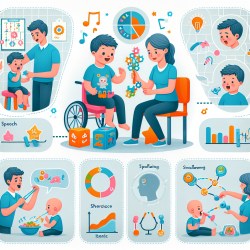Introduction
In the ever-evolving landscape of speech-language pathology, practitioners are continually seeking ways to improve their services and outcomes for children. The recent study titled "COVID-19 impacts on coastal communities in Kenya" provides a unique opportunity to reflect on how external factors, such as the pandemic, can influence community dynamics and, by extension, the delivery of services such as online therapy. This blog explores how the insights from this research can be applied to enhance the effectiveness of online therapy services provided by companies like TinyEYE.
Understanding the Research
The study conducted in Kenya's coastal communities highlights the profound impact of COVID-19 on small-scale fisheries, a crucial livelihood for many. The pandemic disrupted traditional market dynamics, leading to significant economic and social challenges. These disruptions affected the communities' food security and overall wellbeing, emphasizing the need for adaptive strategies to mitigate such impacts.
Key Insights for Online Therapy Practitioners
While the context of the research is geographically and sectorally distinct from online therapy, several insights can be drawn to enhance service delivery:
- Adaptability: Just as the communities had to adapt to new market conditions, online therapy practitioners must remain flexible and responsive to changing client needs and external conditions.
- Communication: The importance of maintaining strong communication channels was underscored in the research. For therapists, this means leveraging technology to ensure consistent and effective communication with clients and their families.
- Resource Allocation: The study highlighted the need for targeted support to the most vulnerable. In online therapy, this translates to prioritizing resources and interventions for children who may be disproportionately affected by external stressors.
Encouraging Further Research
The research on Kenya's coastal communities serves as a reminder of the interconnectedness of global events and local practices. Practitioners are encouraged to engage in further research to understand how broader socio-economic factors can influence therapy outcomes. By staying informed and proactive, therapists can better tailor their approaches to meet the evolving needs of their clients.
Conclusion
Incorporating insights from diverse research areas can significantly enhance the practice of online therapy. By focusing on adaptability, communication, and resource allocation, practitioners can improve outcomes for children, even amidst challenging circumstances. For those interested in exploring the original research paper, you can read it COVID-19 impacts on coastal communities in Kenya.










